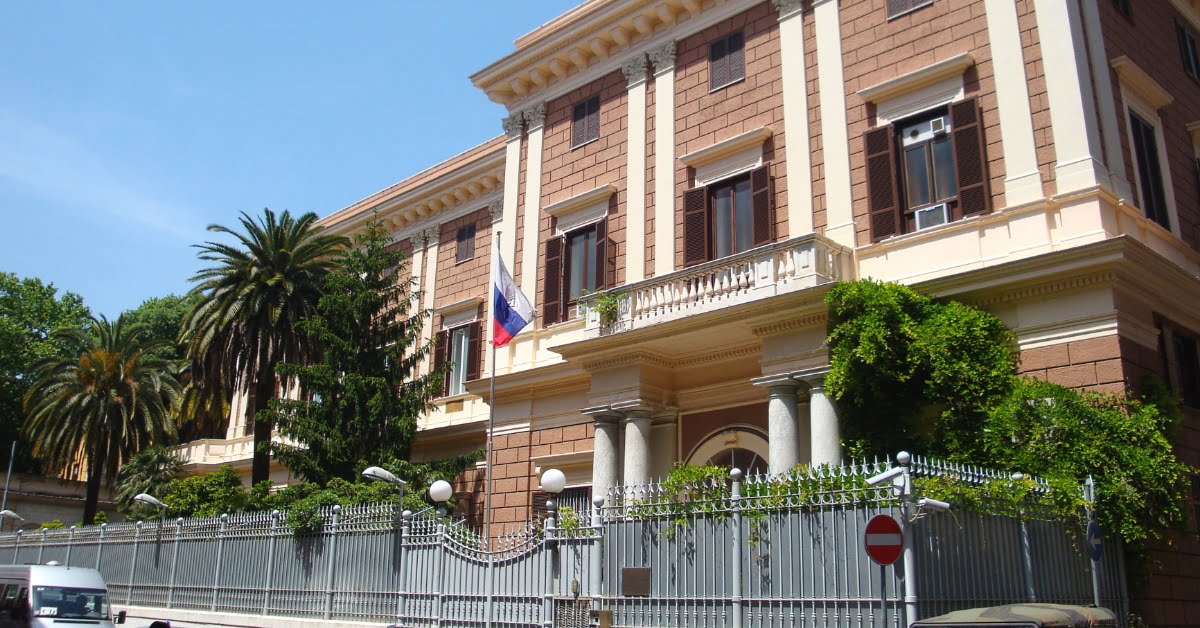It is a common belief that diplomatic mission lands are enclaves within host countries that are legally foreign territory. We checked how true this opinion is.
On February 22, 1984, US President Ronald Reagan, justifying the bombing of Lebanese territory as a response to the shelling of the American embassy, stated: “This is US territory.”
On August 16, 2012, British police entered the Ecuadorian embassy where WikiLeaks founder Julian Assange was hiding. Commenting on this on air "Vesti FM", leading expert of the Center for Political Current Affairs Dmitry Abzalov said that “according to the Vienna Convention, the territory of the embassy and the land under the embassy is also the territory of another country, therefore entry into the territory can only occur with the permission of the consul general or ambassador.”
On October 2, 2018, famous journalist Jamal Khashoggi was killed on the premises of the Saudi Arabian consulate in Istanbul. In response to concerns from local officials, Arab officials answered: “We are ready to let the Turkish authorities in to search the premises. The premises are sovereign territory, but we will allow them to come in and search and do whatever they want. If they ask for it, of course we will allow them. We have nothing to hide."
Similar information can also be read on the legal reference site "UK assistant" (“Legally, the territory of the embassy is an enclave and belongs to the country it represents. Thus, it is not subject to the laws of the state surrounding the embassy.”) This interpretation is widespread in both fiction, and in society as a whole.
Let's take a look at the above Vienna Convention on Diplomatic Relations, which since 1961 has acted as the main document regulating the relevant area of international law. Here's what information you can find there regarding the territorial issue. Article 21.1: “The receiving State must either assist the accrediting State in acquiring on its territory, in accordance with its laws, premises necessary for its representation, or assist the accrediting State in obtaining premises in some other way.”
And that's all. In other words, the convention to which Dmitry Abzalov refers does not say anything that the territory of the diplomatic mission legally belongs to the accrediting country. Moreover, the phrase “its territory” is used in relation to the state of residence of the embassy. Another point is that the receiving State has a “special duty to take all appropriate measures to protect the premises of the mission from any intrusion or damage and to prevent any disturbance to the peace of the mission or insult to its dignity” (Article 30). In addition, “the premises of the mission, their furnishings and other property located therein, as well as the means of transportation of the mission enjoy immunity from search, requisition, seizure and executive actions” (Article 22). But this is a slightly different question.
The substantiation of the statement we are considering often includes such a concept as extraterritoriality. Back in the 17th century, the Dutch jurist Hugo Grotius proposed the following interpretation: “The general rule is that he who is on foreign territory is subject to the laws of that territory; has, by the general consent of nations, an exception in relation to ambassadors, since ambassadors, by virtue of a certain convention, are, as it were, outside the territory and thereby are not bound by the civil laws of the people among whom they live.” This principle was taken as a basis in international diplomacy and continues to operate today. Thus, according to the same Vienna Convention, a diplomatic agent (and only he) enjoys a number of privileges - in particular, immunity from the criminal jurisdiction of the receiving state (Article 31).
Moreover, as modern writers write researchers, “since the fiction of being in one’s own country applied not only to the person of the ambassador, but also to the premises he occupied, this theory in its absolute form served as a justification both for the right of asylum in diplomatic premises and for the right of the ambassador to have jurisdiction over his personnel.” However, the theory of extraterritoriality began to lose its authority from the second half of the 19th century and, in many respects, is in conflict with the principles of modern international law. Therefore, in practice it leads to erroneous conclusions and gives rise to many misunderstandings. At present, the theory of extraterritoriality is practically not used, although references to it are found in periodicals and diplomatic practice. Usually extraterritoriality is mentioned in in a narrower sense.
And finally, a striking example of a specific legal answer to the question that interests us. On November 4, 1979, members of the Organization of Muslim Students seized the US Embassy in Tehran and held those there hostage for 14 months. Later, the former hostages and their relatives sued both Iran (the organizers of the attack) and the American side (the embassy owners), demanding monetary compensation from the latter. However, the US Court of Appeals decidedthat the territory of the country's embassy "remains the territory of the host state and is not the territory of the United States." In the context of our question, such emergency situations are, of course, rare. Much more often you can hear that a person, having visited the embassy, “visited his native land”, or that a child born at the embassy was “born on the territory of the corresponding country”. However, all these interpretations have no legal basis.
Mostly not true
Read on the topic:
1. Vienna Convention on Diplomatic Relations
2. G. V. Bobylev, A. A. Nagieva. Towards a theoretical justification of diplomatic immunities and privileges
If you find a spelling or grammatical error, please let us know by highlighting the error text and clicking Ctrl+Enter.







